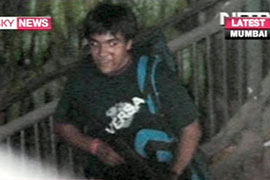Indian troops end Mumbai siege
Death toll tops 190 as commandos kill last remaining gunman holed up in Taj Mahal hotel.

Other reports put the death toll at over 200 and there were concerns that it could further rise as emergency services combed the rooms at the Taj Mahal hotel for more bodies.
Twenty policemen were killed in the attacks, that also left another 295 people injured, officials said.
Taj siege
Indian commando units emerged from the smoke-filled Taj hotel and firemen moved in to douse a fierce blaze on Saturday morning.
| In depth |
|
|
Sniffer dogs were later taken into the hotel as security forces made a final sweep through the rooms of the building.
James Bays, Al Jazeera’s correspondent at the scene, said some Indian news journalists had been allowed into the hotel amid the clean-up operations.
“The media have been allowed a lot closer to the hotel to see what has gone on here. When you look up close you can really see the kind of battle that has taken place here. You can see glass on the ground, bullet holes … parts of the hotel are burnt out,” he said.
The Mumbai attacks began on Wednesday night, when armed men attacked 10 locations around the city, later taking hostages at the Taj Mahal and Trident-Oberoi hotels and at a Jewish centre at the Nariman House.
Special forces ended the sieges at the Nariman House and the Trident-Oberoi hotel late on Friday.
At the Trident-Oberoi hotel, commandos found 24 bodies after gaining control of the building, while the bodies of several hostages, including the rabbi who ran the Jewish centre, were recovered from Nariman House.
Commandos were said to have rescued a total of 610 people from the three siege locations.
Indians mourned the dead and began cremating those who lost their lives. Thousands turned up at the funeral of Hemant Karkare, Mumbai’s anti-terrorism squad chief, who was killed in the attacks.
Attacker captured
There was speculation about how many attackers had taken part in the deadly, co-ordinated attacks across India’s financial capital.
 |
| Indians began cremating their dead from the Mumbai attacks [AFP] |
Vilasrao Deshmukh, state chief minister for Maharashtra, said that there were 10 attackers.
“Nine were killed and one was captured,” he said. “We are interrogating him.”
There was speculation that the attacks had been carried out by two co-ordinated groups.
One group entered Mumbai by boat, while others were believed to have rented property in the city, stockpiling arms and explosives, before the attacks were launched.
A previously unknown group calling itself the Deccan Mujahidin had claimed responsibility for the attacks, suggesting the origins of the attacks were from inside India.
But Indian officials said the sole surviving gunman was from Pakistan, hinting at a possible cross-border link.
R R Patil, Deshmukh’s deputy, identified the captured attacker as Mohammad Ajmal Qasam, a Pakistani national, and said that the attackers had sophisticated equipment and used “GPS, mobile and satellite phones to communicate”.
He also said: “They were constantly in touch with a foreign country,” but refused to give further details.
‘Pakistan role’
The Indian media, citing unidentified police investigators, reported that three alleged attackers had confessed to being members of Lashkar-e-Tiyaba, a Pakistan-based group which aims to end Indian rule in Kashmir.
Lashkar-e-Tiyaba had earlier denied any role in the attacks.
 |
| Security forces said there were ten attackers [AFP] |
In a speech on Thursday, Manmohan Singh, the Indian prime minister, blamed “external forces”, a phrase sometimes used to refer to Pakistan-based fighters.
For its part, Pakistan has condemned the attacks and said it will fully co-operate with an Indian investigation.
However, Islamabad has abandoned its earlier decision to send the head of the Inter-Services Intelligence [ISI] directorate to India.
“A spokesman of the Prime Minister’s House has said that a representative of ISI will visit India instead of the Director General of the ISI to help in investigating the Mumbai terrorism incident,” a government statement, released on Saturday, said.
Asif Ali Zardari, Pakistan’s president, vowed the “strictest” action if Pakistani involvement was shown but warned India against any “over-reaction” following the attacks.
“Let me assure you that if any evidence points to any individual or any group in this part of the world, I shall take the strictest of action in the light of this evidence and in front of the world,” Zardari said in an interview with Indian CNN-IBN television.
“Whoever is responsible for the brutal and crude act against the Indian people and India are looking for reaction. We have to rise above them and make sure ourselves, yourself and [the] world community guard against over-reaction.”

 Timeline of Mumbai attack
Timeline of Mumbai attack